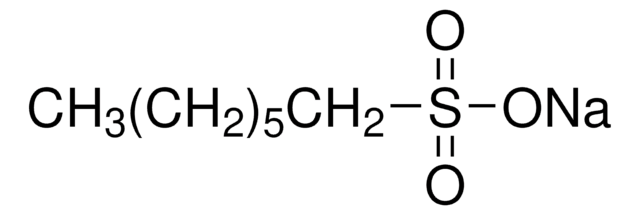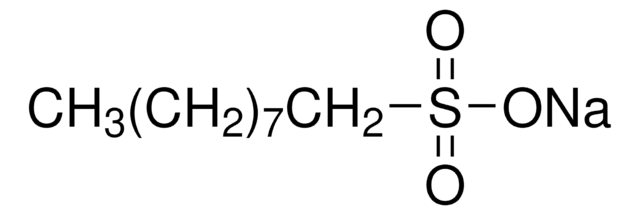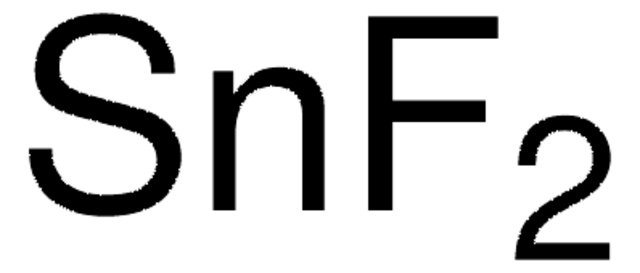30633
Sodium 1-decanesulfonate
≥99.0% (T)
Synonym(s):
1-Decanesulfonic acid sodium salt
Sign Into View Organizational & Contract Pricing
All Photos(1)
About This Item
Linear Formula:
CH3(CH2)8CH2SO3Na
CAS Number:
Molecular Weight:
244.33
Beilstein:
3918920
EC Number:
MDL number:
UNSPSC Code:
12161900
PubChem Substance ID:
NACRES:
NA.25
Recommended Products
description
anionic
Quality Level
Assay
≥99.0% (T)
mol wt
244.33 g/mol
technique(s)
electrophoresis: suitable
mp
>300 °C (lit.)
solubility
H2O: 0.05 g/mL, clear
SMILES string
[Na+].CCCCCCCCCCS([O-])(=O)=O
InChI
1S/C10H22O3S.Na/c1-2-3-4-5-6-7-8-9-10-14(11,12)13;/h2-10H2,1H3,(H,11,12,13);/q;+1/p-1
InChI key
AIMUHNZKNFEZSN-UHFFFAOYSA-M
Looking for similar products? Visit Product Comparison Guide
General description
Sodium 1-decanesulfonate is an ion-associating reagent.
Application
Ion-associating reagent for HPLC, including analyses of peptides and proteins.
Storage Class Code
11 - Combustible Solids
WGK
WGK 3
Flash Point(F)
Not applicable
Flash Point(C)
Not applicable
Personal Protective Equipment
dust mask type N95 (US), Eyeshields, Gloves
Choose from one of the most recent versions:
Already Own This Product?
Find documentation for the products that you have recently purchased in the Document Library.
Customers Also Viewed
Miriam Gochin et al.
Journal of medicinal chemistry, 52(14), 4338-4344 (2009-06-19)
The hydrophobic pocket within the coiled coil domain of HIV-1 gp41 is considered to be a hot-spot suitable for small molecule intervention of fusion, although so far it has yielded only microM inhibitors. Previous peptide studies have identified specific hydrophobic
Luigi Battaglia et al.
Journal of pharmaceutical sciences, 103(7), 2157-2165 (2014-05-16)
The major obstacle to glioblastoma pharmacological therapy is the overcoming of the blood-brain barrier (BBB). In literature, several strategies have been proposed to overcome the BBB: in this experimental work, solid lipid nanoparticles (SLN), prepared according to fatty acid coacervation
Mixtures of catanionic surfactants can be superspreaders: Comparison with trisiloxane superspreader.
N M Kovalchuk et al.
Journal of colloid and interface science, 459, 250-256 (2015-08-25)
Mixed solutions of cationic and anionic surfactants show considerable synergism in their wetting behaviour, but their spreading is affected considerably by the phase separation processes. The valuable information about wetting properties of synergetic mixtures can be obtained by using mixtures
Hongyan Yang et al.
ACS chemical neuroscience, 6(8), 1487-1501 (2015-07-15)
In vivo microdialysis is widely used to investigate how neurotransmitter levels in the brain respond to biologically relevant challenges. Here, we combined recent improvements in the temporal resolution of online sampling and analysis for serotonin with a brief high-K(+) stimulus
Franziska Mohr et al.
PloS one, 10(10), e0141136-e0141136 (2015-10-28)
The muscarinic M2 receptor (M2R) acts as a negative feedback regulator in central cholinergic systems. Activation of the M2 receptor limits acetylcholine (ACh) release, especially when ACh levels are increased because acetylcholinesterase (AChE) activity is acutely inhibited. Chronically high ACh
Our team of scientists has experience in all areas of research including Life Science, Material Science, Chemical Synthesis, Chromatography, Analytical and many others.
Contact Technical Service









